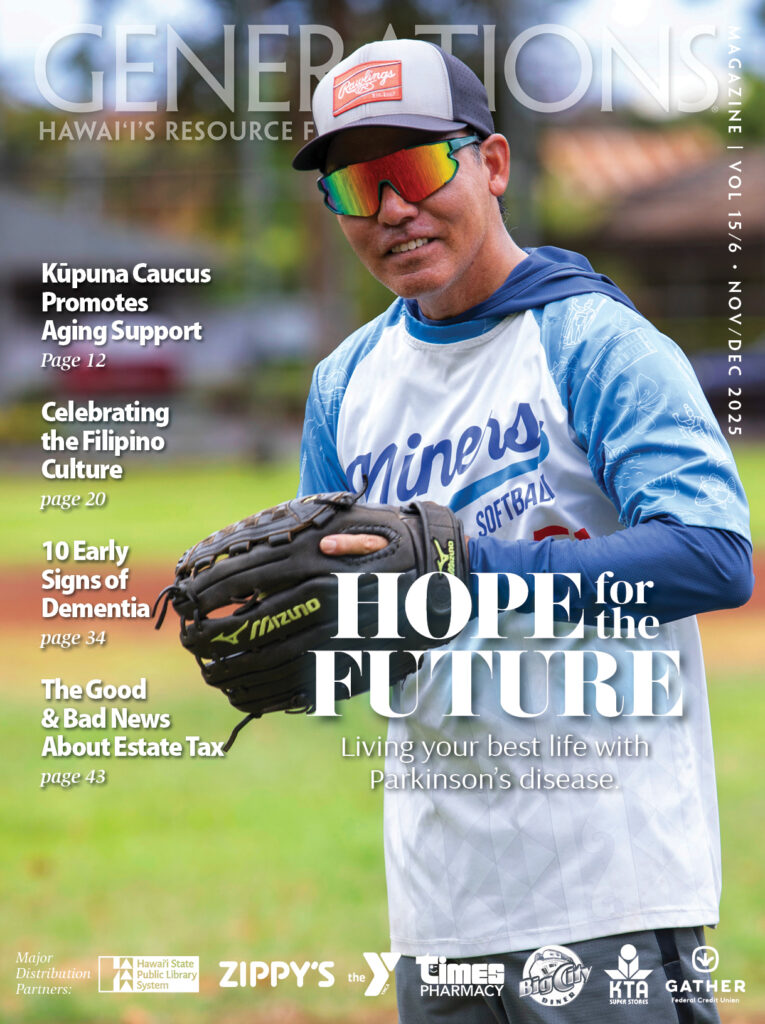It is 6:55 on Monday morning and a small group is gathering outside Lē‘ahi Hospital. Several women with walkers and wheelchairs wait with their sons or daughters for the Lē‘ahi Adult Day Health Center doors to open. The caregivers converse with each other and the ladies greet each other as they wait. As the doors open at 7:00, Mrs. G heads straight for a pedal exerciser for a morning warm-up. Others gather around a table and begin folding napkins that will be used later in the day. Some are chatting about their weekend activities and the weather. As the family members rush off to work, staff members are greeting new arrivals and assisting them to their seats. Another busy day has begun!
All around our state, programs like this one are providing a cheerful, social environment in where assistance is available when needed. For family caregivers who have to work, these programs are a vital service to help keep loved ones at home.
Many people imagine that “adult day care” is much like pre-school. In reality, day care programs are more like a club for seniors. While most newcomers are somewhat reluctant to attend at first, the center quickly becomes a comfortable place to go where friends, assistance and reassurance can always be found. The staff is trained to provide discreet assistance, while activities provide satisfactory outcomes regardless of physical and mental abilities. The predictable routine and familiar faces create a satisfying, normal day, even for individuals with memory loss. Participants often look forward to their days at the program as the highlights of their week.
In addition to providing a social environment, day centers provide one or two meals per day and nutritious snacks in the morning and afternoon. Day Health programs can usually offer special diets and individual nutritional oversight. Group mealtimes are enjoyable and often foster better nutrition. At Waipahu Hale Adult Day Care, for example, the dining area has been fashioned into a bistro with a restaurant atmosphere.
Activities in these programs are age appropriate and designed to be purposeful. Sakura House in Honolulu offers a culturally specific program that focuses on Japanese language, culture and food. Some programs feature intergenerational activities on a regular basis. The Seagull Schools Adult Day Care in Kapolei is co-located with a pre-school, resulting in regular interactions between keiki and kuˉpuna. Franciscan Adult Day Center in Maˉnoa enjoys rich interaction with various grade levels at St. Francis School. All-day programs offer a range of activities that offer mental, social, physical and spiritual enrichment.
As providers of adult day services, our primary goal is to improve quality of life for both seniors and their families. We strive to help older adults maintain their functional abilities and stay safely at home for as long as possible. We never forget that we are also serving the caregivers who often need respite from the demands of giving care. Even when used on a part-time basis, two or three days per week, families have noted improvements in their loved one and increased ability to deal with the care giving task.
Day Care FAQs
Cost: Adult day services can range from $40 to $100 per day, depending on the level of assistance needed. Services are not covered by Medicare or medical insurance. Day Health is sometimes covered by Medicaid. Many long-term care insurance policies will cover day services. While the cost may seem high at first, over the course of an 8- or 10-hour service day, the average fee may come out to less than $5 per hour. Most programs do not pro-rate services on an hourly or partial day basis.
Hours: Most programs are open from about 7 a.m. to 5:30 p.m. or 6 p.m., Monday through Friday. Saturday service is available at some centers and several programs such as Pearl City Hale and Waipahu Hale are open 365 days per year.
‘Day Care’ vs. ‘Day Health’: These are two different levels of care. ‘Day Care’ is mostly supportive, social-model care. ‘Day Health’ provides some nursing assistance and is required when a client has more complex medical needs. Those who are not ambulatory, or need help with toileting and/ or medication, may need Day Health.
Licensing: In Hawai‘i, day service programs are regulated by the State of Hawai‘i and required to meet certain standards for certification. Any adult day care program serving five or more clients is required to have certification from the Department of Human Services. Day Health programs are licensed by the Department of Health.
Benefits:
Social stimulation is one of the most beneficial aspects of day programs. Interacting with people other than our own family, and using our social skills, often makes us feel sharper and more alert. This also helps to maintain our sense of identity and self-worth. It also brings us back to “normal” daily routines that we knew during most of our active lives.
Participants in these programs gain a sense of satisfaction upon completion of their day. Even simple “horizons” like regularly scheduled meals or a 2 p.m. Bingo game help us to maintain our sense of orientation.
Because activity uses energy during the day, most participants sleep better at night and may experience less waking up during the nights, allowing their caregivers much needed rest.
Activity and the sense of purpose gained from participation may mean less depression and fewer health complaints. This can sometimes result in fewer doctor visits or emergency room trips.
The program staff can also provide the family with regular reports, vital signs and other useful health information.
Caregiver strain is often reduced because there is less worry if the loved one is in a safe, supervised environment and not home alone. Free time for self-care, to take a break or do necessary chores and errands is also important.
For more information on local day care resources, you can visit the website of our statewide providers’ coalition, Adult Day Services Hawai‘i, Inc. at www.AdultCentersHawaii.com.


Leave a Reply